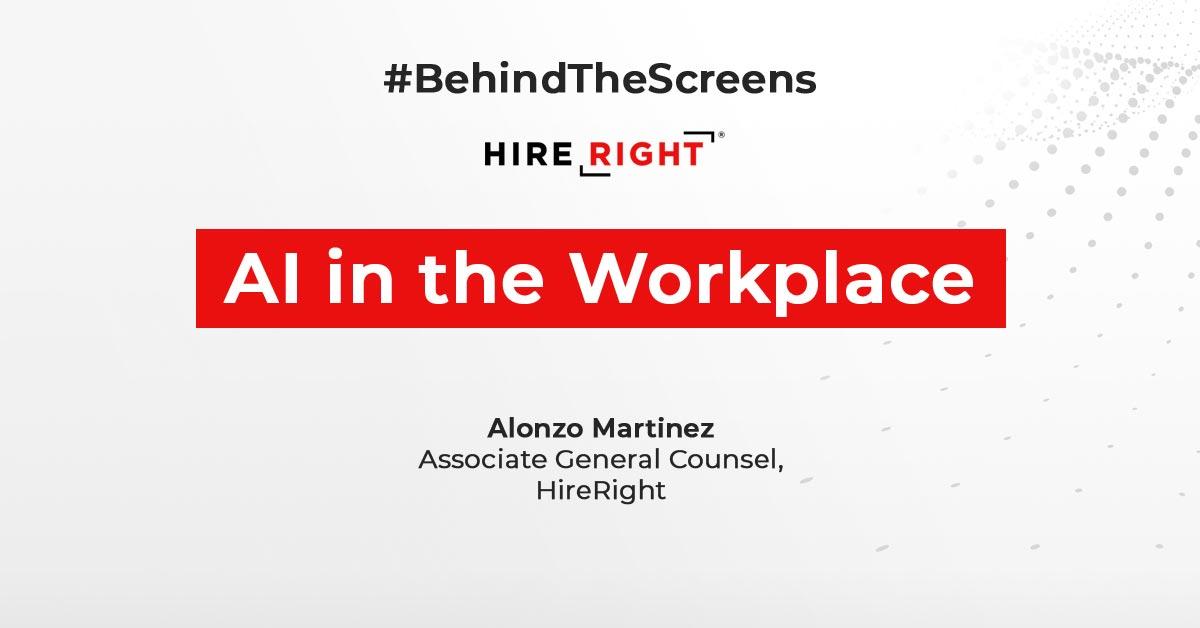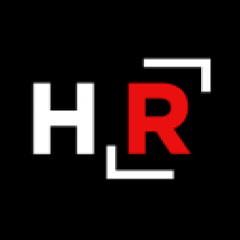#BehindTheScreens – AI in the Workplace
AI is quickly becoming prolific in the workplace and HR practices. We talk to Alonzo Martinez, HireRight Associate General Counsel about Artificial Intelligence in Human Resources, and the legal aspects.

Welcome to another episode of Behind the Screens, a HireRight video series shedding light on the latest in background screening, HR and Talent Acquisition insights, and more. In this episode, host Suzanne DeBow is joined by Alonzo Martinez, Associate General Counsel at HireRight.
Suzanne and Alonzo shed light on how AI is being used in recruiting practices and performance management tactics. As more and more companies are turning to AI to support hiring and employment, legislation is trying to catch up.
AI in the Workplace – Key Points
AI algorithms can be leveraged in recruitment to sort through resumes and job applications in addition to screening video interviews.
In addition to recruiting, AI can be used to manage existing employees through performance management software.
Legislation is struggling to keep up with the speed at which companies are adopting AI technologies, but increasingly, legislation is passing to protect nondiscriminatory hiring practices.
Listen to the episode now or read the transcript below.
Transcript:
SUZANNE: How is AI used in employment and hiring? Can you give us some examples?
ALONZO: AI algorithms can be used to help with decision-making at nearly every stage of employment. With respect to recruiting and hiring talent, AI can review résumés and talent profiles to filter out candidates based on their job history, education qualifications, or professional skills. AI can analyze video interviews submitted by candidates. Some employers have used recruiting “chatbots” – i.e., virtual assistants that can communicate with candidates by asking screening questions, scheduling interviews, and collecting other pertinent recruiting information – to automate other aspects of the recruiting process.
And employers are increasingly using algorithms for performance management. Employees who fail to meet specified performance metrics may also be subject to formal discipline, including termination of employment, at the recommendation of AI algorithms. Some algorithms can even analyze patterns of conduct to predict when an employee is likely to quit, thereby permitting employer intervention and allowing companies to take action to retain critical talent.
SUZANNE: Do you see a need for regulation for employers using Artificial Intelligence and why?
ALONZO: Well, whether or not I think that regulation is important, the fact of the matter is that it’s coming for us. It’s clear that the use of artificial intelligence in the employment lifecycle is pervasive, and that’s what concerns lawmakers. Technology has outpaced regulation – so now it’s a game of catch-up. Algorithms, like humans, are not immune from bias. So, that’s what lawmakers are currently trying to understand and address.
SUZANNE: Will we see regulation in the HR/AI space and what does that mean for background screening?
ALONZO: Yes, we already are. Last fall, the EEOC announced its intentions to ensure that AI and other emerging technologies used in hiring and other employment decisions comply with the laws that the EEOC enforces. At the state and local level, we’ve seen Illinois, Maryland, and New York City all place compliance obligations on employers and in some cases vendors of AI solutions. From a background check perspective, it’s likely that if AI plays into the background check process, employers may be required to audit AI solutions to ensure that bias does not play into its decisions.
SUZANNE: Thanks Alonzo, that was really interesting! This has been Behind the Screens with HireRight, and we will see you next time!
Release Date: August 23, 2022

HireRight
HireRight is a leading provider of on-demand employment background checks, drug and health screening, and electronic Form I-9 and E-Verify solutions that help employers automate, manage and control background screening and related programs.